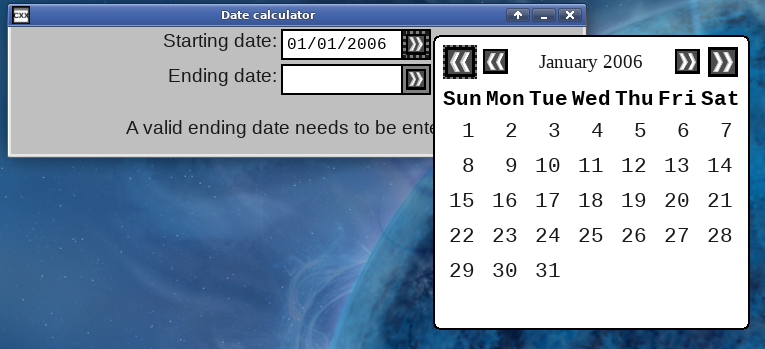Chapter 6. Date input fields

A date input field is a customized input field for entering dates. The input field validated and reformats the typed in date to a consistent format. Alternatively, a button next to the input field opens a popup with a monthly calendar for picking a date directly off the calendar.
dateinputfield.C creates two date input fields,
and shows the number of days between the two entered dates:
/* ** Copyright 2018-2021 Double Precision, Inc. ** See COPYING for distribution information. */ #include "config.h" #include <x/mpobj.H> #include <x/exception.H> #include <x/destroy_callback.H> #include <x/ref.H> #include <x/obj.H> #include <x/appid.H> #include <x/w/main_window.H> #include <x/w/gridlayoutmanager.H> #include <x/w/gridfactory.H> #include <x/w/date_input_field.H> #include <x/w/label.H> #include <x/w/canvas.H> #include <string> #include <iostream> #include <sstream> #include "close_flag.H" #include <optional> #include <tuple> #include <iostream> #include <x/ymd.H> #include <x/locale.H> #include <x/mpobj.H> std::string x::appid() noexcept { return "dateinputfield.examples.w.libcxx.com"; } // A helper object that holds the current values of the starting and the // ending date fields. // // The values get updated by callbacks attached to those fields. The // starting_date and ending_date values are mutex-protected objects, using // x::mpobj from the base LibCXX library, because they could potentially // be accessed by multiple execution threads, the main one and the // internal library execution thread that executes the callbacks. struct currently_shown_datesObj : virtual public x::obj { x::mpobj<std::optional<x::ymd>> starting_date; x::mpobj<std::optional<x::ymd>> ending_date; // The label that prompts for the next possible action. const x::w::label status_label; currently_shown_datesObj(const x::w::label &status_label) : status_label{status_label} { } // update_label() gets invoked from the callbacks, and updates the // message at the bottom of the window according to the values entered // into the two date input fields. void update_label() { auto s=starting_date.get(); auto e=ending_date.get(); // If the starting date field is empty: if (!s) { status_label->update("A valid starting date needs " "to be entered"); return; } // If the ending date field is empty: if (!e) { status_label->update("A valid ending date needs " "to be entered"); return; } // Both valid dates are entered. std::string diff=std::to_string(*e - *s); status_label->update("Number of days between " + s->format_date("%x") + " and " + e->format_date("%x") + ": " + diff); } }; typedef x::ref<currently_shown_datesObj> currently_shown_dates; // Create the contents of the main window. Return the two date input fields. static std::tuple<x::w::date_input_field, x::w::date_input_field > create_main_window(const x::w::main_window &mw) { auto lm=mw->gridlayout(); auto f=lm->append_row(); f->halign(x::w::halign::right).create_label("Starting date:"); x::w::date_input_field starting_date=f->create_date_input_field(); // set() sets the value of the date field. // Set the initial values to the current date. starting_date->set( x::ymd{} ); f=lm->append_row(); f->halign(x::w::halign::right).create_label("Ending date:"); x::w::date_input_field ending_date=f->create_date_input_field(); // The label field at the bottom will display various messages of // varying lengths. Normally the window automatically sizes itself // go be just big enough to accomodate its contents. In order to // avoid having the window constantly adjusting its size every time // the message changes, add an invisible canvas spacer, 150 millimeters // wide. This seems to be wide enough to accomodate all messages. f=lm->append_row(); f->colspan(2).create_canvas({ std::nullopt, {150, 150, 150}, {0, 0, 0}}); f=lm->append_row(); // Create the aforementioned label element, a placeholder, and // call update_label() to set its initial contents. auto label=f->colspan(2).halign(x::w::halign::center) .padding(4).create_label(""); auto current_values=currently_shown_dates::create(label); // The on_change() callback on a date input field gets executed // when the contents of the date input field change. // The on_change() callbacks gets invoked as soon as its install, // with the date input field's current contents. We'll use this // initial invocation to update the message at the bottom of the // window. // // The on_change() callback receives the current date entered into // the input field. No value gets returned if the field is empty // or the date could not be parsed. // // Note that both callbacks capture current_values, which has a // reference on the label display elements. The starting_date and // ending_date display elements are neither the parent nor the child // elements of the label display element. This does not create a // circular reference between the objects. starting_date->on_change ([current_values] (ONLY IN_THREAD, const std::optional<x::ymd> &new_value, const x::w::callback_trigger_t &trigger) { current_values->starting_date=new_value; current_values->update_label(); }); // However for the ending date's callback, we'll suppress taking the // action for the x::w::initial invocation. It serves no useful // purpose, the field is empty. ending_date->on_change ([current_values] (ONLY IN_THREAD, const std::optional<x::ymd> &new_value, const x::w::callback_trigger_t &trigger) { if (std::holds_alternative<x::w::initial>(trigger)) return; current_values->ending_date=new_value; current_values->update_label(); }); return {starting_date, ending_date}; } void dateinputfields() { x::destroy_callback::base::guard guard; auto close_flag=close_flag_ref::create(); x::w::date_input_fieldptr starting_date, ending_date; auto main_window=x::w::main_window ::create([&] (const auto &mw) { std::tie(starting_date, ending_date)=create_main_window(mw); }); main_window->set_window_title("Date calculator"); guard(main_window->connection_mcguffin()); main_window->on_disconnect([] { exit(1); }); main_window->on_delete ([close_flag] (ONLY IN_THREAD, const auto &ignore) { close_flag->close(); }); main_window->show_all(); close_flag->wait(); // get() returns the current values of the date input field. auto final_starting_date=starting_date->get(); auto final_ending_date=ending_date->get(); if (final_starting_date) std::cout << "Final starting date: " << *final_starting_date << std::endl; if (final_ending_date) std::cout << "Final ending date: " << *final_ending_date << std::endl; } int main(int argc, char **argv) { try { dateinputfields(); } catch (const x::exception &e) { e->caught(); exit(1); } return 0; }
Date input fields use the
x::ymd class
from the base LibCXX library to represent its dates;
dateinputfield.C's
main() also uses the library's
x::locale
to set the library's locale to the system environment's locale.
This enables localized month and days of week names in the date input
field's popup.
A factory's create_date_input_field()'s
method creates a new
x::w::date_input_field
widget. dateinputfield.C shows how to
use its set() and get()
methods to set or get the current date in the widget.
dateinputfield.C also demonstrates an alternative
way to obtain the entered date. on_change()
installs a callback that the library invokes whenever the
date input field's content change.
dateinputfield.C installs a callback into both
of its date input fields. When both dates are entered the number of
days between the two dates gets computed and displayed in a
label below the two input fields.